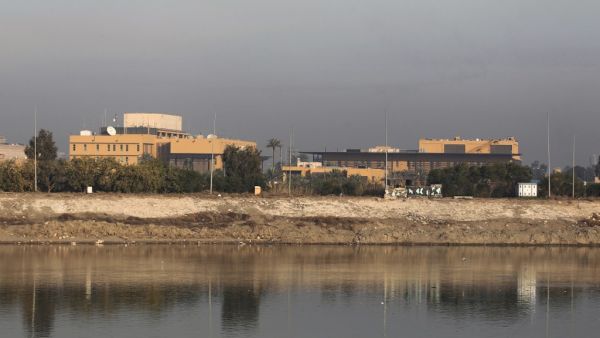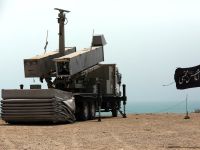Eight rockets targeted the US Embassy in Baghdad’s heavily fortified Green Zone late Sunday, Iraq’s military and Iraqi officials said, sparking fears of renewed unrest as next month’s anniversary of the US slaying of an Iranian general draws near.
An Iraqi military statement said an “an outlawed group” launched eight rockets targeting the Green Zone, injuring one Iraqi security person manning a checkpoint and causing material damage to a residential complex and some cars. The residential complex is usually empty.
The US Embassy’s C-RAM defense system, which is used to destroy missiles in mid-air, was activated to deflect the attack, the embassy said in a statement.
3 rockets target US Embassy in Baghdad: Reporthttps://t.co/bS0HFf9ZBM pic.twitter.com/LzKGGT9aDt
— Hindustan Times (@htTweets) December 21, 2020
“The US Embassy confirms rockets targeting the International Zone (Green Zone) resulted in the engagement of embassy defensive systems,” the statement said. It said there was some minor damage to the embassy compound.
“We call on all Iraqi political and governmental leaders to take steps to prevent such attacks and hold accountable those responsible,” the statement said.
The thundering sound of the defense system could be heard on the other side of the Tigris River.
The C-RAM system was installed by the US over the summer as armed groups stepped up rocket attacks targeting the embassy and its premises.
The US withdrew some staff from its embassy in Baghdad earlier this month, temporarily reducing personnel ahead of the first anniversary of the US airstrike that killed Iran’s top general, Qassim Soleimani, outside Baghdad’s airport on Jan. 3. American officials said the reduction stemmed from concerns about a possible retaliatory strike.
Soleimani’s killing sparked outrage and led Iraq’s parliament to pass a non-binding resolution days later calling for the expulsion of all foreign troops from Iraq.
The frequency of rocket attacks in Iraq has frustrated the Trump administration. Iran-backed militia groups have been blamed for orchestrating the attacks.
Watch: Video shows US anti-missile defense systems intercept at least three Katyusha rockets that were launched targeting the #US embassy in #Iraq’s Green Zone in #Baghdad.https://t.co/c8lOBB0iSW pic.twitter.com/uaI0JFlej5
— Al Arabiya English (@AlArabiya_Eng) December 20, 2020
In September, Washington warned Iraq that it will close its embassy in Baghdad if the government fails to take decisive action to end rocket and other attacks by Iranian-backed militias on American and allied interests in the country.
Unusual move
The partial withdrawal from the embassy came amid a drawdown of American troops from Iraq and Afghanistan announced by the outgoing Trump administration last month. In Iraq, the US plans to reduce the number of troops from 3,000 to 2,500 by mid-January, before Trump is to leave office.
The attacks have been claimed by groups that both US and Iraqi officials have described as smokescreens for well-known Iran-aligned armed factions in Iraq.
But in an unusual move, several factions condemned Sunday’s attack.
Moqtada Sadr, a populist cleric and former militia leader, tweeted that “no one has the right to use weapons outside of the state.”
Even Kataeb Hezbollah, which has been blamed for other attacks, issued an online statement.
“Bombing the (US) embassy of evil at this time is considered out of order,” it said, while also condemning the US embassy’s use of the C-RAM system.
The statement could be an attempt to calm tensions ahead of the anniversary on January 3 of the US drone strike that killed Soleimani and leading Iraqi paramilitary figure Abu Mahdi al-Muhandis.
Western and Iraqi officials said they believe that Iran is looking to maintain calm ahead of US President Donald Trump’s departure from the White House next month.
This article has been adapted from its original source.








